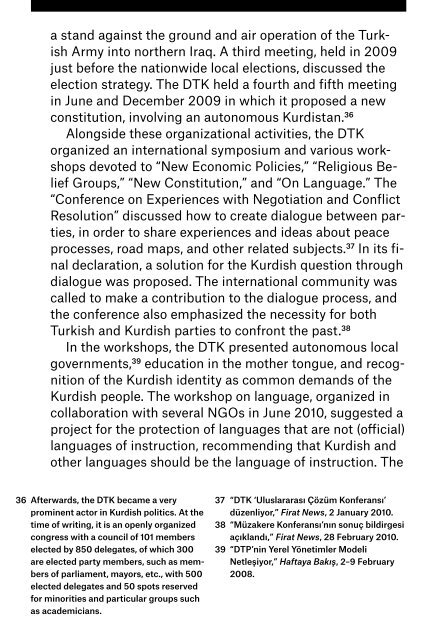Stateless Democracy
NWA5-Stateless-Democracy1.pdf?utm_content=buffer7beda&utm_medium=social&utm_source=twitter
NWA5-Stateless-Democracy1.pdf?utm_content=buffer7beda&utm_medium=social&utm_source=twitter
You also want an ePaper? Increase the reach of your titles
YUMPU automatically turns print PDFs into web optimized ePapers that Google loves.
a stand against the ground and air operation of the Turkish<br />
Army into northern Iraq. A third meeting, held in 2009<br />
just before the nationwide local elections, discussed the<br />
election strategy. The DTK held a fourth and fifth meeting<br />
in June and December 2009 in which it proposed a new<br />
constitution, involving an autonomous Kurdistan. 36<br />
Alongside these organizational activities, the DTK<br />
organized an international symposium and various workshops<br />
devoted to “New Economic Policies,” “Religious Belief<br />
Groups,” “New Constitution,” and “On Language.” The<br />
“Conference on Experiences with Negotiation and Conflict<br />
Resolution” discussed how to create dialogue between parties,<br />
in order to share experiences and ideas about peace<br />
processes, road maps, and other related subjects. 37 In its final<br />
declaration, a solution for the Kurdish question through<br />
dialogue was proposed. The international community was<br />
called to make a contribution to the dialogue process, and<br />
the conference also emphasized the necessity for both<br />
Turkish and Kurdish parties to confront the past. 38<br />
In the workshops, the DTK presented autonomous local<br />
governments, 39 education in the mother tongue, and recognition<br />
of the Kurdish identity as common demands of the<br />
Kurdish people. The workshop on language, organized in<br />
collaboration with several NGOs in June 2010, suggested a<br />
project for the protection of languages that are not (official)<br />
languages of instruction, recommending that Kurdish and<br />
other languages should be the language of instruction. The<br />
workshop emphasized that non-state actors should not<br />
confine themselves to raise demands for official recognition<br />
of the Kurdish language but should also organize it by<br />
themselves. 40<br />
In summation, we could conclude that since 2005, the<br />
Kurdish movement in Turkey, within the framework of<br />
democratic confederalism, gradually opened up a political<br />
and social space for the Kurdish identity. While going<br />
through such a process, the Kurdish movement, which<br />
has governed a significant number of municipalities since<br />
1999, has been based on two main organizational forms:<br />
the legal party (the DTP, and afterwards the BDP) and<br />
a wider congress, the DTK. The DTP and BDP aimed at<br />
expanding Kurdish identity politics based on the concept of<br />
democratic confederalism and democratic autonomy. Lastly,<br />
the DTK proclaimed that it would construct democratic<br />
autonomy from the bottom-up. Though admittedly vague<br />
in its content, this proclamation constitutes, on the one<br />
hand, the boldest effort ever made by the Kurdish movement<br />
to forge a disengagement from the Turkish public<br />
sphere, bringing with it an increased risk of clashes. On the<br />
other hand, it is capable of posing the question, Could this<br />
be the framework of a “real” solution? In what follows, we<br />
will discuss this in relation to the possibilities of a political<br />
solution for the Kurdish issue.<br />
IV. Conclusion<br />
182–183<br />
36 Afterwards, the DTK became a very<br />
prominent actor in Kurdish politics. At the<br />
time of writing, it is an openly organized<br />
congress with a council of 101 members<br />
elected by 850 delegates, of which 300<br />
are elected party members, such as members<br />
of parliament, mayors, etc., with 500<br />
elected delegates and 50 spots reserved<br />
for minorities and particular groups such<br />
as academicians.<br />
37 “DTK ‘Uluslararası Çözüm Konferansı’<br />
düzenliyor,” Firat News, 2 January 2010.<br />
38 “Müzakere Konferansı’nın sonuç bildirgesi<br />
açıklandı,” Firat News, 28 February 2010.<br />
39 “DTP’nin Yerel Yönetimler Modeli<br />
Netleşiyor,” Haftaya Bakış, 2–9 February<br />
2008.<br />
It is clear that the 2000s have been the most critical period<br />
yet for the PKK. The party has experienced this critical moment<br />
in different phases, which can roughly be divided into<br />
three stages: a) shock and retreat (1999); b) impasse and<br />
40 “‘Anadilde Eğitim’ için 1 milyon izma<br />
Meclis’te,” Bianet, 25 February 2011,<br />
online at: http://www.bianet.org/bianet/<br />
ifade-ozgurlugu/128164-anadilde-egitimicin-1-milyon-imza-mecliste.


